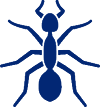Bedbugs or bed bugs are small parasitic insects of the family Cimicidae (most commonly Cimex lectularius). The term usually refers to species that prefer to feed on human blood. All insects in this family live by feeding exclusively on the blood of warm-blooded animals. The name ‘bedbug’ is derived from the insect’s preferred habitat of houses and especially beds or other areas where people sleep. Bedbugs, though not strictly nocturnal, are mainly active at night and are capable of feeding unnoticed on their hosts.
A number of health effects may occur due to bed bugs including skin rashes, psychological effects and allergic symptoms. Diagnosis involves both finding bed bugs and the occurrence of compatible symptoms. Treatment involves the elimination of the insect but is otherwise symptomatic.
Bed bugs have been known by a variety of names including wall louse, mahogany flat, crimson rambler, heavy dragoon, chinche, and redcoat. Largely eradicated as pests in the developed world (primarily through the use of DDT) in the early 1940s, bedbugs have seen a resurgence since about 1995.
Bedbugs are obligatory hematophagous (bloodsucking) insects. Most species feed on humans only when other prey are unavailable. Bedbugs are attracted to their hosts primarily by carbon dioxide, secondarily by warmth, and also by certain chemicals.
A bedbug pierces the skin of its host with two hollow feeding tubes. With one tube it injects its saliva, which contains anticoagulants and anesthetics, while with the other it withdraws the blood of its host. After feeding for about five minutes, the bug returns to its hiding place.






